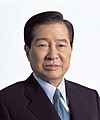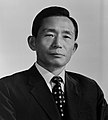Portal:South Korea
 |
환영합니다! / Welcome To The South Korea Portal!  South Korea, officially the Republic of Korea (ROK), is a country in East Asia. It constitutes the southern half of the Korean Peninsula and borders North Korea along the Korean Demilitarized Zone. The country's western border is formed by the Yellow Sea, while its eastern border is defined by the Sea of Japan. Like North Korea, South Korea claims to be the sole legitimate government of the entire peninsula and adjacent islands. It has a population of 51.96 million, of which half live in the Seoul Capital Area, the ninth most populous metropolitan area in the world. Other major cities include Busan, Daegu, and Incheon. The Korean Peninsula was inhabited as early as the Lower Paleolithic period. Its first kingdom was noted in Chinese records in the early 7th century BCE. After the unification of the Three Kingdoms of Korea into Silla and Balhae in the late 7th century, Korea was ruled by the Goryeo dynasty (918–1392) and the Joseon dynasty (1392–1897). The succeeding Korean Empire (1897–1910) was annexed in 1910 into the Empire of Japan. Japanese rule ended following Japan's surrender in World War II, after which Korea was divided into two zones: a northern zone, which was occupied by the Soviet Union, and a southern zone, which was occupied by the United States. After negotiations on reunification failed, the southern zone became the Republic of Korea in August 1948, while the northern zone became the communist Democratic People's Republic of Korea the following month. In 1950, a North Korean invasion began the Korean War, which ended in 1953 after extensive fighting involving the American-led United Nations Command and the People's Volunteer Army from China with Soviet assistance. The war left 3 million Koreans dead and the economy in ruins. The authoritarian First Republic of Korea led by Syngman Rhee was overthrown in the April Revolution of 1960. However, the Second Republic failed to control the revolutionary fervor. The May 16 coup of 1961 led by Park Chung Hee put an end to the Second Republic, signaling the start of the Third Republic in 1963. South Korea's devastated economy began to soar under Park's leadership, recording one of the fastest rises in average GDP per capita. Despite lacking natural resources, the nation rapidly developed to become one of the Four Asian Tigers based on international trade and economic globalization, integrating itself within the world economy with export-oriented industrialization. The Fourth Republic was established after the October Restoration of 1972, in which Park wielded absolute power. The Yushin Constitution declared that the president could suspend basic human rights and appoint a third of the parliament. Suppression of the opposition and human rights abuse by the government became more severe in this period. Even after Park's assassination in 1979, the authoritarian rule continued in the Fifth Republic led by Chun Doo-hwan, which violently seized power by two coups and brutally suppressed the Gwangju Uprising. The June Democratic Struggle of 1987 ended authoritarian rule, forming the current Sixth Republic. The country is now considered among the most advanced democracies in continental and East Asia. (Full article...) Selected article -"Candy" (Korean: 캔디) is a song recorded by South Korean boy group H.O.T., released as part of the group's debut studio album We Hate All Kinds of Violence through SM Entertainment on September 7, 1996. Along with "Warrior's Descendant", it serves as one of the two singles from the record. "Candy" is a "cheerful" bubblegum pop dance number, and was written and produced by Jang Yong-jin. Upon the album's release, "Candy" was met with widespread recognition in South Korea and has been credited with sparking a new wave of mainstream music in the country's youth. H.O.T. promoted "Candy" with televised live performances on weekly South Korean music programs in late 1996 and January 1997, and topped the chart rankings for several weeks. In a 2005 survey conducted by MTV Korea, it was voted the most popular song of 1996 in South Korea by netizens. (Full article...) Selected image The 2010 G-20 Seoul summit was the fifth meeting of the G-20 heads of government to discuss the global financial system and the world economy. It was held in Seoul, South Korea. More did you know -
In the news
This is a Good article, an article that meets a core set of high editorial standards.
 Japan's preference: Sea of Japan North Korea's preference: Korean East Sea South Korea's preference: East Sea A dispute exists over the international name for the body of water which is bordered by Japan, Korea (North and South) and Russia. In 1992, objections to the name Sea of Japan were first raised by North Korea and South Korea at the Sixth United Nations Conference on the Standardization of Geographical Names. The Japanese government supports the exclusive use of the name "Sea of Japan" (Japanese: 日本海), while South Korea supports the alternative name "East Sea" (Korean: 동해; Hanja: 東海), and North Korea supports the name "Korean East Sea" (조선동해; 朝鮮東海). Currently, most international maps and documents use either the name Sea of Japan (or equivalent translation) by itself, or include both the name Sea of Japan and East Sea, often with East Sea listed in parentheses or otherwise marked as a secondary name. The International Hydrographic Organization, the governing body for the naming of bodies of water around the world, in 2012 decided it was still unable to revise the 1953 version of its publication S-23 – Limits of Oceans and Seas, which includes only the single name "Sea of Japan", to include "East Sea" together with "Sea of Japan". The involved countries (especially Japan and South Korea) have advanced a variety of arguments to support their preferred name(s). Many of the arguments revolve around determining when the name Sea of Japan became the common name. South Korea argues that historically the more common name was East Sea, Sea of Korea, or another similar variant. South Korea further argues that the name Sea of Japan did not become common until Korea was under Japanese rule, at which time it had no ability to influence international affairs. Japan argues that the name Sea of Japan has been the most common international name since at least the beginning of the 19th century, long before its annexation of Korea. Both sides have conducted studies of antiquarian maps, but the two countries have produced divergent research results. Additional arguments have been raised regarding the underlying geography of the sea as well as potential problems regarding the ambiguity of one name or the other. (Full article...) General images -The following are images from various South Korea-related articles on Wikipedia.
Did you know (auto-generated)
WikiProjectsSee WikiProject Korea for collaborating on South Korea topics, and more broadly, on all things Korea-related. South Korea topics
CategoriesAdministrative divisions of South Korea
Related portalsEast Asia Associated WikimediaThe following Wikimedia Foundation sister projects provide more on this subject:
Web resources
SourcesDiscover Wikipedia using portals
|























































